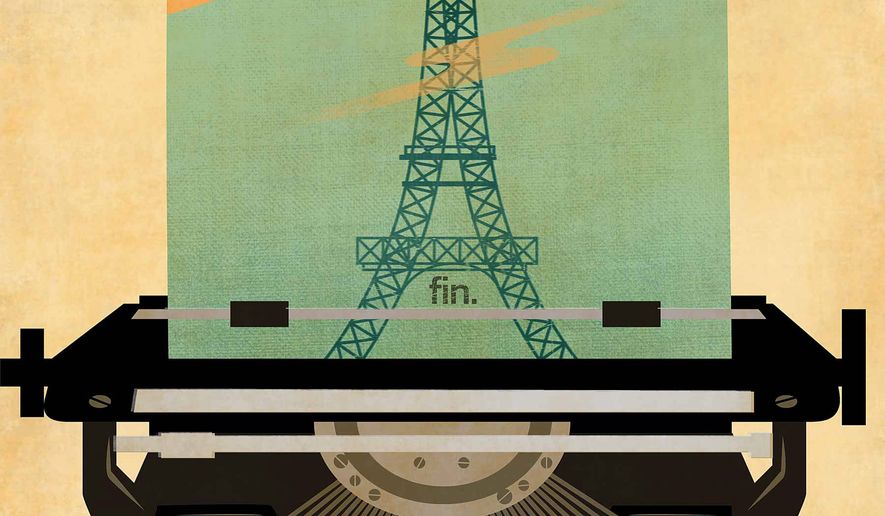OPINION:
Michel Houellebecq is a sardonic and iconoclastic French novelist, winner of the prestigious Prix Goncourt, and subject of considerable controversy in Europe these days. He deserves to be controversial here in the United States as well.
He calls his most recent novel a work of “political fiction.” Titled “Soumission” (in English, “Submission,” in Arabic, an accurate translation would be “Islam”), it is set in the near future, in France, “a Western civilization now ending before our very eyes.”
Coincidence No. 1: “Soumission” was published in France the same week jihadis attacked the offices of Charlie Hebdo, slaughtering as many members of the editorial staff as they could.
Coincidence No. 2: The satirical magazine’s cover that week featured a caricature of Mr. Houellebecq. It showed him with a large, pimpled nose and bleary eyes, smoking a cigarette and wearing a wizard’s hat. The caption read: “Predictions of the sorcerer Houellebecq.” In cartoon balloons, he is making two: “In 2015, I’ll lose my teeth,” and “In 2022, I’ll observe Ramadan.”
A very good English language translation of the novel has now been published. If I were to send copies to President Obama and all the presidential candidates, do you think they’d read it?
Mr. Houellebecq’s protagonist, Francois, is a world-weary, middle-aged, literature professor at the Sorbonne, a great expert on Joris-Karl Huysmans, a writer of the 19th century Decadent movement. Though bored by academia, Francois’ enthusiasm for young women and haut cuisine remain undiminished. Not a particularly political animal, he is only mildly concerned when the Socialists begin negotiating with France’s Muslim Brotherhood party to defeat Marine Le Pen’s “nativist” National Front.
A politically savvy acquaintance explains that the Muslim Brotherhood and the Socialists “see eye to eye” on economic issues, “and what’s more the Muslims can actually bring order to the banlieues. In foreign policy, they want France to take a slightly firmer stand against Israel, but that’s hardly a problem for the left.”
Most important to the Muslim Brotherhood, he says, is “birthrate and education. To them it’s simple — whichever segment of the population has the highest birthrate, and does the best job of transmitting its values, wins. If you control the children, you control the future.”
Also, they demand the Socialists recognize polygamy and agree that it should “come with the same benefits and tax exemptions.” This falls under “the theory of minority sharia, which the Muslim Brotherhood has already embraced.”
We learn that such political developments are not unique to France. In Belgium, a Muslim political party has just won a national election, and Islamic parties are ascendant in Britain, Holland and Germany as well.
At the same time, the European Union is being reoriented toward the Mediterranean. Negotiations are underway to bring Algeria, Tunisia and Morocco into the EU. “Preliminary talks had begun with Lebanon and Egypt.”
Before long, France is celebrating the inauguration of a new president: Mohammad Ben Abbes. He is an Islamist (he prefers to achieve Islamic supremacy through the ballot box), not a jihadist (he does not hold with those who believe the path to the caliphate can only be cleared with the sword).
Francois elaborates: “Unlike his sometime rival Tariq Ramadan, who’d been tainted by his old Trotskyite connections, Ben Abbes had kept his distance from the anticapitalist left. Whereas Ramadan presented sharia as forward-looking, even revolutionary, Ben Abbes restored its reassuring, traditional value — with a perfume of exoticism that made it all the more attractive.”
Certainly, President Ben Abbes has no intention of turning France into a dystopia along the lines of the Islamic State. But, backed by Middle Eastern petromonarchs, a transformation of French life and culture begins. On campus, Francois notices “the way the girls in burkas carried themselves. They moved slowly and with new confidence, walking down the very middle of the hallway, three by three, as if they were already in charge.”
Francois’ 22-year-old Jewish girlfriend, Myriam, prepares to emigrate. She is not eager to go (“France is my home I love France I love I don’t know I love the cheese”) but her parents insist and she understands: “When a Muslim party comes to power, it’s never good for the Jews. Can you think of a time it was?” she asks Francois.
After the election, the Sorbonne is restored to financial health by a Saudi prince and renamed the Islamic University of Paris-Sorbonne. As a non-Muslim, Francois is no longer permitted to teach there. This is no reflection on the quality of his scholarship, the new president of the university, Robert Rediger, a convert to Islam, reassures him. And, of course, he is free to continue his career at a secular university. Alternatively, he can retire — he is eligible for a generous pension “effective immediately.”
At first, Francois leans toward that option. Teaching has provided little satisfaction. However, he finds himself increasingly intrigued by the political, philosophical and theological perspectives articulated by the university president — whom the new government promotes to the post of “secretary of universities.”
Among other things, he argues that “the summit of human happiness resides in the most absolute submission.” He thinks it apparent that, “Islam had been chosen for world domination.”
Francois is struck, too, by how Secretary Rediger lives: “a forty-year-old wife to do the cooking, a fifteen-year-old wife for whatever else . No doubt he had one or two wives in between.”
I suspect you’ve already guessed where the story goes from there. The larger question, the one that Mr. Houellebecq has now thrust into France’ public square, the one that has set off such a scandal, is where Europe is going and what it will look like when it gets there.
• Clifford D. May is president of the Foundation for Defense of Democracies and a columnist for The Washington Times.




Please read our comment policy before commenting.